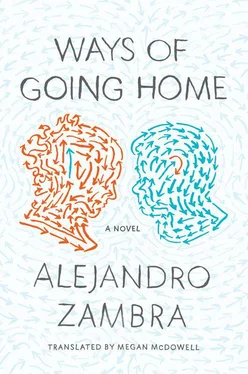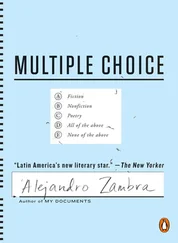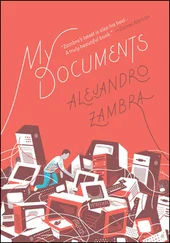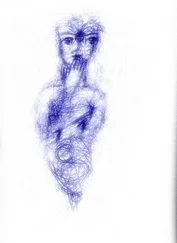We give up on a book when we realize that it wasn’t for us. From wanting to read it so badly we believed it was up to us to write it. We were tired of waiting for someone to write the book that we wanted to read.
I don’t plan to give up on my novel, though. Eme’s silence wounds me and I understand why. I made her read the manuscript, and now I want to make her accept it. And the weight of her possible disapproval makes me wish I hadn’t written it, or to give up on it. But no. I’m not going to give up on it.
* * *
I had planned to have lunch with my parents, but the prospect of watching them celebrate Piñera’s victory discourages me. I call them and tell them I won’t be coming out to vote. On the bus I listen to very good songs, but suddenly music, any music, becomes unbearable. I put my headphones away and I start reading Promise at Dawn . I’m transfixed by this line: “Instead of howling, I write books.”
I vote with a sense of sorrow, with very little faith. I know that Sebastián Piñera will win the first round and I’m sure he will also win the second. It seems horrible. It’s obvious we’ve lost our memories. We will calmly, candidly, hand the country over to Piñera and to Opus Dei and the Legionaries of Christ.
After voting I call my friend Diego. I wait for him a long time, sitting on the grass in the plaza, close to the pool. We take the long walk to the Maipú Temple, and we pass by the place where the Toqui supermarket used to be. Diego is from Iquique but he’s lived in Maipú for ten years. “The deli and the bakery were good,” I tell him, and I describe the supermarket in detail. He listens respectfully, but it’s possible he thinks my interest is ridiculous, since supermarkets are all the same.
“I’ve never been to the temple before,” says Diego. We go inside in the middle of one of the many Sunday masses. There aren’t many people. We sit near the altar. I look at the little flags, I count them. Afterward we sit on the stairs of the entrance and we can hear the mass over the loudspeaker. We talk while some kids play soccer, and every once in a while they kick the ball close to us. I hurry to kick it back, but suddenly one of them kicks the ball hard and it hits Diego in the face. We expect them to apologize or at least to smile apologetically. They don’t. I sit there holding the ball, the kids come over, they take it from my hands. I’m furious. I want to scold them. To raise them right.
We talk about Maipú, about the Chilean idea of a villa, so different from the Argentine or Spanish one. The dream of the middle class, but a middle class without rituals, without roots. I ask him if he remembers a soap opera on Channel 13 called Villa Nápoli . Diego doesn’t remember. Sometimes I forget that he is much younger than me.
We talk about my novel, but also about the novel Diego published recently and that I read a few weeks before. I tell him I liked it; I try to explain why I liked it. I think of one scene in particular. The protagonist travels to Buenos Aires with his father and asks him for a book. The father buys it for him and, to show his approval, he opens it and says, “It’s sturdy.”
“You didn’t make that up,” I say to him. “That’s the kind of thing you don’t make up.” Diego laughs, shaking his head as if he were dancing to heavy metal. “No, I didn’t make it up,” he says.
Then we go to the apartment where Diego lives with his mother, in Avenida Sur. His mother’s name is Cinthya. We talk about the results, which by that hour of the afternoon are already clear. Second round, with a huge advantage for Piñera.
Diego prepares the avocado and adds oil. I tell him avocado doesn’t need oil. “My dad always gets on me for that too,” he says, and laughs.
“At least your dad has that right,” I answer, and I laugh, too.
* * *
“I thought you were joking when you said you were writing about me,” Eme told me in the restaurant. She looked at me as if searching for my face. I felt that she was choosing her words carefully. That she was getting ready to talk. But she stopped at a smile.
We went to eat sushi at the same place as always. Our order took longer than it should have and I remembered the lunch scene when I was a child — the anguish of leaving with the food on the table. “It’s like in the novel,” I was going to say to her, but she was looking at me with extinguished curiosity. Now I think she was looking at me with compassion. I thought we were approaching that period of the wait when the only possible topic of conversation is the wait. But she began another conversation, with a tone that she seemed to have thought about, that she surely had been practicing at length for days.
“I haven’t changed that much,” she said. “And neither have you. Some weeks ago I told you we should pretend we have just met. I don’t understand very well what I wanted to say to you. I think that during these months we’ve been laughing at what we used to be. But it’s false. We’re still what we used to be. Now we understand everything. But we know very little. We know less than before…”
“But that’s a good thing,” I said fearfully. “It’s good not to know, not to expect more.”
“No. It isn’t good. It would be good if it were real. We want to be together and so we’re prepared even to pretend. We haven’t changed so much that we can be together again. And I wonder if we’re going to change.”
I understood what was coming and I readied myself. In arguments I tended to take refuge in a certain optimism, but she would close her face and then even her body to keep me out. I’ll always remember the pain, one night, years ago: in the middle of an argument we started caressing each other and she got on top of me, but in the middle of penetration she couldn’t control her rage and she shut her vagina completely.
Suddenly, unexpectedly, Eme started talking about the novel. She had liked it, but throughout her reading she couldn’t avoid an ambiguous feeling, a hesitation. “You told my story,” she said, “and I ought to thank you, but no, I think I’d prefer it if no one told that story.” I explained that it wasn’t exactly her life, and that I had only taken some images, some memories we had shared. “Don’t make excuses,” she said. “You left some cash in the safe but you still robbed the bank.” It struck me as a silly, vulgar metaphor.
The sushi arrived, finally. I focused on the salmon sashimi — I ate voraciously, putting too much soy sauce on each piece and letting the ginger and wasabi burn my mouth. It was as if I wanted to punish myself absurdly while thinking how I loved this woman, how it was a complete love and not a worn-out way of loving. How she wasn’t a habit for me, not a vice that was hard to give up. And nevertheless, at that point I wasn’t, I’m not, willing to fight anymore.
I ate the sushi, my pieces and hers as well, and when the tray was empty Eme said to me dryly, “Let’s call this off now.” Just then the manager arrived and began a lengthy apology that neither of us wanted to listen to. He offered us free coffee and dessert on the house to make up for the wait. We listened to him absently. We answered mechanically that it didn’t matter, he shouldn’t worry. And we left, each going our separate way.
When I got home I thought about Eme’s words. I thought she was right. That we know very little. That we used to know more, because we were full of conviction, dogma, rules. That we loved those rules. That the only thing we had really loved was that absurd handful of rules. And now we understand everything. We understand, especially, failure.
Alone again (naturally). What hurts the most is that naturally . Let us go, then, you and I, each our separate way.
Читать дальше












